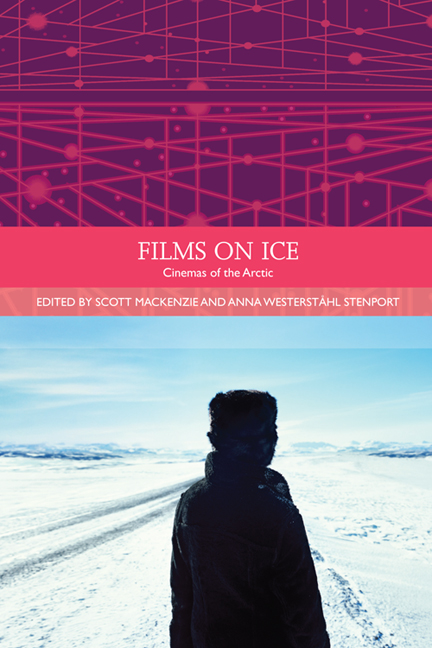Book contents
- Frontmatter
- Contents
- List of Illustrations
- Acknowledgements
- Traditions in World Cinema
- Introduction: What are Arctic Cinemas?
- PART I GLOBAL INDIGENEITY
- PART II HOLLYWOOD HEGEMONY
- PART III ETHNOGRAPHY AND THE DOCUMENTARY DILEMMA
- PART IV MYTHS AND MODES OF EXPLORATION
- 20 The Changing Polar Films: Silent Films from Arctic Exploration 1900–30
- 21 The Attractions of the North: Early Film Expeditions to the Exotic Snowscape
- 22 Frozen in Motion: Ethnographic Representation in Donald B. MacMillan's Arctic Films
- 23 ‘My Heart Beat for the Wilderness’: Isobel Wylie Hutchison, Jenny Gilbertson, Margaret Tait and Other Twentieth-Century Scottish Women Filmmakers
- 24 ‘Here will be a Garden-City’: Soviet Man on an Arctic Construction Site
- 25 Transcending the Sublime: Arctic Creolisation in the Works of Isaac Julien and John Akomfrah
- 26 DJ Spooky and Dziga Vertov: Experimental Cinema Meets Digital Art in Exploring the Polar Regions
- Notes on the Contributors
- Index
23 - ‘My Heart Beat for the Wilderness’: Isobel Wylie Hutchison, Jenny Gilbertson, Margaret Tait and Other Twentieth-Century Scottish Women Filmmakers
from PART IV - MYTHS AND MODES OF EXPLORATION
Published online by Cambridge University Press: 05 September 2016
- Frontmatter
- Contents
- List of Illustrations
- Acknowledgements
- Traditions in World Cinema
- Introduction: What are Arctic Cinemas?
- PART I GLOBAL INDIGENEITY
- PART II HOLLYWOOD HEGEMONY
- PART III ETHNOGRAPHY AND THE DOCUMENTARY DILEMMA
- PART IV MYTHS AND MODES OF EXPLORATION
- 20 The Changing Polar Films: Silent Films from Arctic Exploration 1900–30
- 21 The Attractions of the North: Early Film Expeditions to the Exotic Snowscape
- 22 Frozen in Motion: Ethnographic Representation in Donald B. MacMillan's Arctic Films
- 23 ‘My Heart Beat for the Wilderness’: Isobel Wylie Hutchison, Jenny Gilbertson, Margaret Tait and Other Twentieth-Century Scottish Women Filmmakers
- 24 ‘Here will be a Garden-City’: Soviet Man on an Arctic Construction Site
- 25 Transcending the Sublime: Arctic Creolisation in the Works of Isaac Julien and John Akomfrah
- 26 DJ Spooky and Dziga Vertov: Experimental Cinema Meets Digital Art in Exploring the Polar Regions
- Notes on the Contributors
- Index
Summary
This chapter examines the work of two Scottish women filmmakers, Isobel Wylie Hutchison and Jenny Gilbertson, who like Scottish filmmaker and poet, Margaret Tait, were compelled to make films independently and on a small scale. Like Tait, they were drawn to the North (the Arctic in the case of Hutchison and Gilbertson) in their own search for extremes to, in the words of Tait's poem ‘Storms’, ‘test their strength against’ (Tait in Neely 2012: 39).
Isobel Wylie Hutchison (1889–1982), born in Edinburgh, travelled throughout Greenland and Alaska, collecting flowers and plant life for her work as a botanist, and recording her experiences through her writing and filmmaking. In addition to filmmaking she published both poetry and prose, much of it documenting her travels. She was also a regular contributor to National Geographic throughout the 1940s and 1950s. Jenny Gilbertson (1902–90), born in Glasgow, first trained as a teacher and journalist before moving to Shetland in the 1930s where she lived and worked for several decades. Later in life, after raising a family, she relocated to Northern Canada. She made several films in both Shetland and Canada. A Crofter's Life in Shetland (UK, 1931), her first film made in Shetland, was purchased by the GPO Film Unit. John Grierson, who was the director of the GPO Film Unit at the time, described the film as ‘one of the best descriptions of life in the country anybody has yet made’ (London Film Co-op 1994). In Canada, Gilbertson travelled to the High Arctic, documenting her journey through both written and filmed diaries. Two of her Arctic films were produced for CBC and the BBC.
The focus of this chapter is on the work of Gilbertson and Hutchison during their time in the Arctic; however, this will be considered alongside the work of Tait and within the general context of Scottish women filmmakers during the twentieth century. In particular, the chapter will examine their shared yearning for lone adventures, which all three were compelled to document and explore on paper and through the lens of a camera.
- Type
- Chapter
- Information
- Films on IceCinemas of the Arctic, pp. 299 - 309Publisher: Edinburgh University PressPrint publication year: 2014



